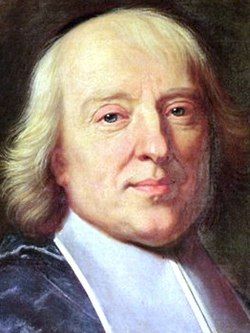
Jacques-Bénigne Lignel Bossuet (French: [bɔsɥɛ]; 27 September 1627 – 12 April 1704) was a French bishop and theologian. Renowned for his sermons, addresses and literary works, he is regarded as a brilliant orator and literary stylist of the French language.
A native of Dijon, Bossuet was educated at a Jesuit school before enrolling in the College of Navarre in Paris, where he studied philosophy and theology. In 1652, he was ordained a priest and became a Doctor of Divinity. He spent the next seven years at Metz, where he honed his skills in oratory and politics, before returning to Paris and establishing his reputation as a great preacher. By the early 1660s, Bossuet was preaching regularly before the court of King Louis XIV at Versailles. He was appointed tutor to the Dauphin in 1670 and elected to the Académie Française a year later. In 1681, he was appointed Bishop of Meaux, a position he held until his death. Bossuet was a strong advocate of political absolutism and the divine right of kings. Later in his life, he was also involved in the controversies over Gallicanism and Quietism, and supported the king's revocation of the Edict of Nantes, which abolished the rights of the Huguenot Protestant minority. Bossuet died in 1704 at the age of 76.
The works of Bossuet best known to English speakers are three great orations delivered at the funerals of Queen Henrietta Maria, widow of Charles I of England (1669), of her daughter Henriette, Duchess of Orléans (1670), and of the outstanding military commander le Grand Condé (1687). He published his Discours sur l'histoire universelle (Discourse on Universal History) in 1681.
Source : Wikipedia